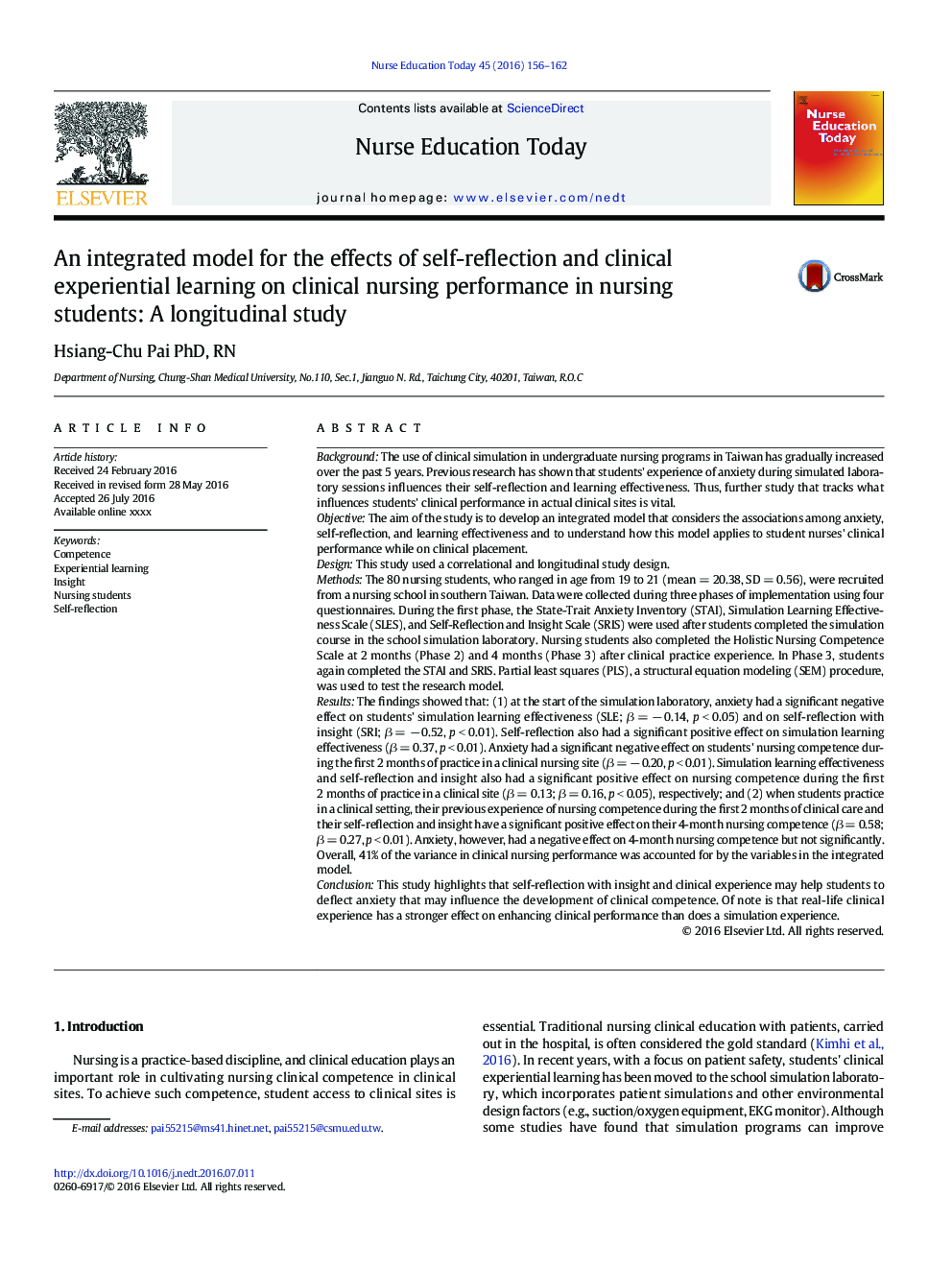| کد مقاله | کد نشریه | سال انتشار | مقاله انگلیسی | نسخه تمام متن |
|---|---|---|---|---|
| 367809 | 621543 | 2016 | 7 صفحه PDF | دانلود رایگان |
• Anxiety directly affects individual learning effectiveness and self-reflection with insight in a school simulation laboratory.
• Self-reflection and learning effectiveness further influence the first 2 months of nursing competence in an actual clinical setting.
• Following the first 2 months of clinical practice, nursing competence has the strongest direct effect at the 4-month mark of clinical nursing competence.
• Although anxiety does not have a direct impact on clinical performance, during 4 months of clinical practice, it does have a direct impact on students’ self-reflection, which, in turn, affects students’ clinical nursing competence.
BackgroundThe use of clinical simulation in undergraduate nursing programs in Taiwan has gradually increased over the past 5 years. Previous research has shown that students' experience of anxiety during simulated laboratory sessions influences their self-reflection and learning effectiveness. Thus, further study that tracks what influences students' clinical performance in actual clinical sites is vital.ObjectiveThe aim of the study is to develop an integrated model that considers the associations among anxiety, self-reflection, and learning effectiveness and to understand how this model applies to student nurses' clinical performance while on clinical placement.DesignThis study used a correlational and longitudinal study design.MethodsThe 80 nursing students, who ranged in age from 19 to 21 (mean = 20.38, SD = 0.56), were recruited from a nursing school in southern Taiwan. Data were collected during three phases of implementation using four questionnaires. During the first phase, the State-Trait Anxiety Inventory (STAI), Simulation Learning Effectiveness Scale (SLES), and Self-Reflection and Insight Scale (SRIS) were used after students completed the simulation course in the school simulation laboratory. Nursing students also completed the Holistic Nursing Competence Scale at 2 months (Phase 2) and 4 months (Phase 3) after clinical practice experience. In Phase 3, students again completed the STAI and SRIS. Partial least squares (PLS), a structural equation modeling (SEM) procedure, was used to test the research model.ResultsThe findings showed that: (1) at the start of the simulation laboratory, anxiety had a significant negative effect on students' simulation learning effectiveness (SLE; β = − 0.14, p < 0.05) and on self-reflection with insight (SRI; β = − 0.52, p < 0.01). Self-reflection also had a significant positive effect on simulation learning effectiveness (β = 0.37, p < 0.01). Anxiety had a significant negative effect on students' nursing competence during the first 2 months of practice in a clinical nursing site (β = − 0.20, p < 0.01). Simulation learning effectiveness and self-reflection and insight also had a significant positive effect on nursing competence during the first 2 months of practice in a clinical site (β = 0.13; β = 0.16, p < 0.05), respectively; and (2) when students practice in a clinical setting, their previous experience of nursing competence during the first 2 months of clinical care and their self-reflection and insight have a significant positive effect on their 4-month nursing competence (β = 0.58; β = 0.27, p < 0.01). Anxiety, however, had a negative effect on 4-month nursing competence but not significantly. Overall, 41% of the variance in clinical nursing performance was accounted for by the variables in the integrated model.ConclusionThis study highlights that self-reflection with insight and clinical experience may help students to deflect anxiety that may influence the development of clinical competence. Of note is that real-life clinical experience has a stronger effect on enhancing clinical performance than does a simulation experience.
Journal: Nurse Education Today - Volume 45, October 2016, Pages 156–162
